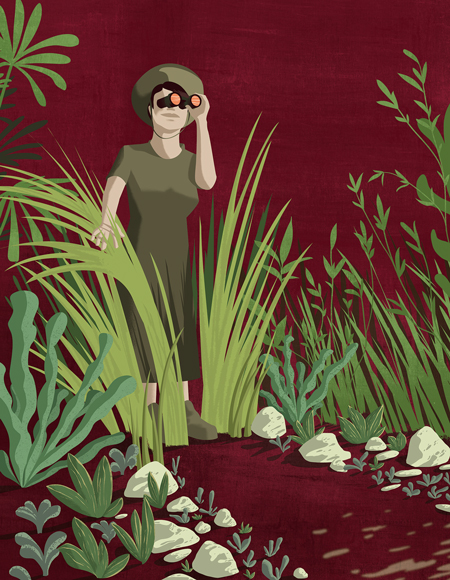
Illustrations by Ana Yael
The Rev. Dr. Joanne Rodriguez grew up in Brooklyn, N.Y., and worked in the banking industry before feeling a call to the church and theological education. Today, she is the executive director of the Hispanic Theological Institute and has served there for more than 20 years. She holds an M.Div. and Th.M. from Princeton Theological Seminary, has become an ordained minister in the Presbyterian Church USA, and is a teaching elder at the Westminster Presbyterian Church in Trenton, N.J.
HTI serves to increase the number of Latino Ph.D. students, graduates, leaders, and faculty, as well as provide a “forum for the exchange of information, ideas, and best practices.” Rodriguez has been a driving force in the effort, and this summer, she was presented with the Women in Leadership Trailblazer Award by the Association of Theological Schools. In Episode 73 of In Trust’s Good Governance podcast, Rodriguez discusses her experience and what she has seen in the field. This is an edited version of the conversation; you can find the full episode at intrust.org.
Trailblazer means innovative, creative, and also going into the wild country. And wild country means desolate uncultivated land, right? And it did feel that way.
What does it mean to be a trailblazer in this field?
Trailblazer means innovative, creative, and also going into the wild country. And wild country means desolate uncultivated land, right? And it did feel that way. Several years ago, I read two studies that said Ph.D. students are getting stuck. More than 50% of students, no matter what color they are, don’t finish their Ph.D. work And I thought to myself, well, it’s not just money. It’s much more than that. So what do you do with desolate land? What do you do with uncultured land or space?
You have to create a system, a process, and space for people to have the resources they need to eventually achieve the degree, the doctorate. And that’s what we’ve been doing. I’ve been listening very attentively to the community, working with the community and building what the students say that they need so that they can finish the degrees and go on to serve in this community. In a way, sometimes we feel like, “oh my gosh, we don’t have a plan. There’s nothing here.” I kind of like working with spaces like that because I don’t have to tear anything down. I’ve got to work with building.
I like working in spaces where we’re making a difference, where there is impact, a change. So that to me is vitally important. That’s what we’ve been doing. And I haven’t done it alone. I work with and for brilliant people. And we’re seeing now, after 25 years, all of that in different spaces in theological education, in religious education, and even in the larger landscape of education. And that’s what I believe the kingdom of God is. It’s not for the future. It’s the here and now.

What about the difficulty of trailblazing?
I think for leaders who really are risk-takers, it’s extremely lonely. There have been times that I have felt extremely lonely, extremely sad, sometimes even defeated. But, theological education is not just intellectual. There’s a spiritual component to this, and we’ve got to tap into that.
When we say we surrender to God, that is a way of surrendering to God. I’ve had these specific times when I’ve had to surrender, and then I’ve seen how suddenly something surprising emerges and that no matter how bright you are, how much you learn to use, there are certain points where, wait, this couldn’t have happened if it wasn’t from God.
So that’s the spiritual component of the work that I also do. And the more that I’ve learned to work both with the intellect but also the heart and the spirituality of this is when I see, wow, we really can do a lot when we are listening to all of those pieces.
What about the issue of resources and scarcity?
We have to be learners our entire life. We have to be excellent listeners for both the spiritual component and the intellectual components of the work that we do. And we have to love what we do, love the people we do it with, love the work that we’re doing and love the people we’re doing it for. And when those three merge, you can really see we no longer live in a world of scarcity. Instead, even when you hit the bottom of the bottom, there’s something that can emerge. Even there, like we talk about the Bible and the dry bones, and yet God says he breathes spirit into those dry bones. And so even when you’re feeling that desolate, the spirit can work and merge those three things so that you can see something beautiful emerge. You have to be patient. It doesn’t happen overnight. I’ve been at this for 25 years.
We are in theological education, and we say, Scripture shows it. We say it, we preach it. We serve a God of love and abundance, and yet we don’t act as people of love and abundance. We’re acting as people of scarcity, fear, and worry. And that’s going to limit what we can do. I know how to put a budget together, and I know that money is needed to build, and because I have knowledge of that I would just say to people: “Think beyond the budget. Think strategically, listen carefully, love the constituencies you’re serving with and for because it can happen. You can build new vision, and you can do new things.” But I’ve seen it too much, people get stuck and they can’t see beyond it, and they’re cutting things just to cut them. They’re not really thinking through budget changes. They’re not really listening to the constituencies who see what they need. They’re not seeing, they’re too caught up with the structures of things and how things are done. And this is the way we’ve done curriculum, and this is what we always have to do. And that is creating scarcity.
We serve a God of love and abundance, and yet we don’t act as people of love and abundance. We’re acting as people of scarcity, fear, and worry.